- Soothing Violence by Joel SalatinTuesday, May 08, 2018
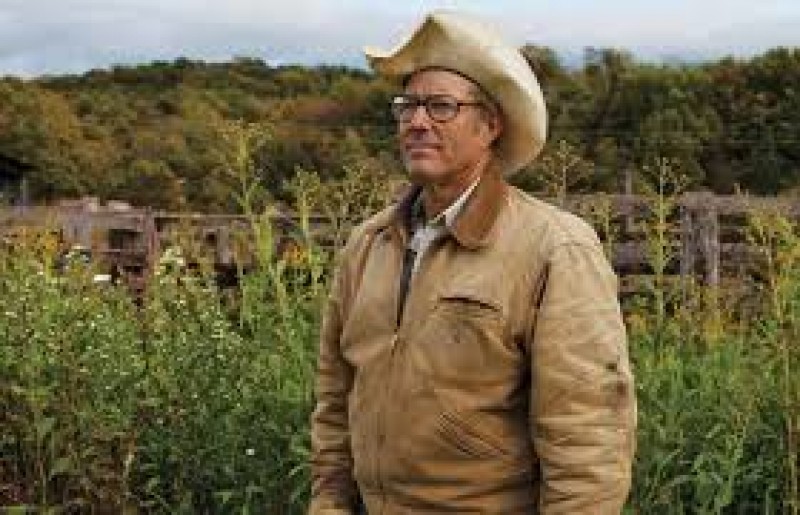
Soothing Violence
By Joel Salatin
Although we spend most of our time in these pages elucidating the technicalities of grass farming, today I want to focus on the poetry, the beauty of grass farming. I remember Allan Nation affirming the soul-soothing properties of silvopastures, and how in every favorite landscape survey ever conducted, it was the pastoral setting that garnered highest admiration.
These thoughts welled up in my soul the other day when I was reflecting, perhaps meditating a bit, on the state of affairs in America. I'm a hopeless news junky. But it comes honestly. After guerillas drove our family off our farm in Venezuela during the junta that ousted Perez Jimenez from power in 1959-60, my Dad developed a keen interest in governmental policy and societal goings-on.
His barrage of letters to the editor to our local daily newspaper resulted in a once-a-month submission backlash policy. He promptly found a few friends who would sign his letters and kept the barrage rolling, albeit with other signatures. This apple didn't fall far from the tree, did it?
In high school, my work on the school paper stoked my boiler enough to make me spend Saturday nights as the newsroom receptionist-phone-answerer at our local daily newspaper. Yes, the same newspaper that tried to put brakes on Dad's submissions. Talk about children being arrows - now he had me on the inside. Ha! Take that, you.
Amazingly, the newspaper staff liked me and asked me to come back full-time as soon as I got out of college, which I did. Then Sept. 24, 1982, I walked out of that office and returned to the farm full-time. Chasing news is simply who I am. But today's news is a bummer.
After the umpteenth story about the thousands dying from opiods, the Florida high school shooting, sanctuary cities, racism - goodness, where does it end? Reading the news can be a real downer these days.
I'm glad Teresa and I don't have a TV; seeing the daily violence, dysfunction, and hurting would be too much. I'll take it without the graphics, thank you very much.
Society has always had problems. Goodness, our culture suffered a horrendous war over sectarian animosity. Prohibition, women's suffrage, WWI, WII, General MacArthur, Martin Luther King, Vietnam, Jane Fonda, Woodstock. We are not without societal unrest.
But these were big cultural issues, with broad support or antagonism. These were broad political movements, communal developments. Today's issues seem more like agonies of the soul. A teenager walks into his school and guns down a bunch of people. Isolated, hurting opiod addicts don't join mobs; they die alone. They don't die in communities.
And civil discourse appears to be jeopardized. From political correctness to thought intolerance, we've moved from free speech to claiming personal injury if we're in the presence of someone who believes differently, especially if that belief is of a conservative bent. As if to add insult to societal injury, we have an explosion of young diseases: autism, childhood leukemia, type II diabetes, food allergies.
These are extremely personal struggles. An amendment to the Bill of Rights cannot correct my child's autism. That new bracelet my teenager wears to give EMT's information regarding his diabetes can't be fixed with a march on Washington. The personal pain in these issues is profound. I grew up never hearing phrases like food allergy, or words like campylobacter, E. coli, salmonella, bovine spongiform encephalopathy. I don't think a single kid in any of my schools, elementary, middle, or high, had diabetes.
Folks, we have a lot of ugly in our culture right now. As I was thinking about this, I couldn't help but think of the New York Times best seller Guns, Germs, and Steel, which examined why some cultures ascended over others. In the section on germs, author Jared Diamond made a compelling case for the immune-enhancing environment created by proximity to domestic livestock.
Couple that with the breakthrough work of Richard Louv in The Nature Principle and a cultural void becomes apparent. The spiritual and emotionally-stabilizing effect of immersion in nature speaks volumes to our current youth crises. That the average American male 25-35 years old spends 20 hours a week playing video games, most of which are highly violent, speaks to an increasingly antagonistic psychology in our social trajectory.
The overwhelming majority of our young people don't care for livestock, don't spend lots of time in nature, and don't eat real food.
I have said for decades that a culture which fails to respect the pigness of pigs will eventually fail to respect the Tomness of Tom and Maryness of Mary. A society that views life from a mechanistic viewpoint will view its people, and other cultures, from a mechanistic viewpoint. Show me one land grant university research project seeking to discover how to make pigs happier. No, it's all mechanistic and extractive: how to grow them faster, fatter, bigger, cheaper.
And nothing has a moral or ethical dimension; everything is subject to technical innovation. If we can, we should. If it's possible, don't bother with consequences. As a society, we treat pigs like inanimate piles of protoplasm to be manipulated however cleverly hubris can imagine. Rather than discovering how to make pigs happy, we discover how to extract their stress gene so we can abuse them more violently but they won't care.
The prophets and poets in the integrity food movement have long forecast that as a nation views its food, so goes its social structure. The thread goes like this: if we do violence to our food, it will eventually do violence to us. In other words, nature, or Creation, depending on your worldview, has a balance sheet as surely as your business has a balance sheet. It demands to be balanced, or die.
As we collectively assault our food system through toxic farming, abusive animal treatment, soil erosion, and genetic adultery is it any wonder that the overall balance sheet will show new health problems, emotional dysfunction, and spiritual bankruptcy?
Having laid this bleak foundation, let me turn a corner and offer sunshine. We as grass farmers offer balm to the bleakness. In all of our discussions about how often to move the cows, how to market a pastured chicken, and all of the other wonderful things we talk about, let's not forget to stop in the meadow, breathe deeply, listen to the meadowlark's call, and weep over the beauty around us.
On our grass farms, we're caressing the earth, wrapping our food system in love and caring. If this gets too mushy for you, keep reading. We all need some mush from time to time. We need the affirmation from being told: "I appreciate what you're doing; it's righteous, sacred, noble work. Just look at the happy, vibrant life you're developing, the earthworms, grasses, spiders, and sleek cows."
We can get scientific and technical, certainly. We can talk about aquifer recharge, vegetative transpiration, hydration, and omega-3 fatty acids. All of us enjoy talking about conjugated linoleic acid (CLA) and riboflavin in our pastured animals. The point is that we are giving back. In fact, we're giving more.
We grass farmers should probably spend one day a year in a Concentrated Animal Feeding Operation (CAFO). If we could get through the no trespassing signs and don the appropriate haz-mat suit, walk through the sheep dip and stand the stench, we would surely discover why food writing guru Michael Pollan said glass walls on factory farms would fundamentally change the way America eats. And if we changed that, it might fundamentally change the way America acts.
The orthodox industrial paradigm to exploit, manipulate, and dominate natural patterns does not bring beauty to our lives. It brings a dead zone the size of Rhode Island in the Gulf of Mexico. It brings lagoon blowouts, fish kills, mono-cultures, MRSA, and rural impoverishment. Posing as progress, it's a blight on our landscape and our society.
Grass farmers bring beauty into this ugliness. I've attended scores of grass-based farm conferences and this group, unlike its industrial counterpart, exudes joy and happiness. Grass farmers don't get together and lament sickness and commodity prices. We don't worry about mutated strains of super-weeds. We talk about land healing, happy cows, and customer wellness.
Most of us welcome school groups, urbanites, environmental organizations, animal welfare crusaders. We want people to come and see, to enjoy the beauty we see every day. So take a minute to enjoy it. Think about this: on your worst day, you didn't want to go shoot somebody. Why? Because the world we create soothes our landscape and our souls.
Who can be angry at everything when the cows express unconditional gratitude for our care? When we enjoy pastured chicken theater daily? When the slurps and throaty gurgles of grazing pigs rises musically to our ears? Perhaps the most valuable thing we grass farmers bring to the plate is beauty.
So hug your partner. Hug your cow. Hug your Johnsongrass. As grass farmers, we're distinctly privileged to soothe violence. Surrounded by functional beauty, we embrace it, nurture it, and ultimately bring it to our culture as a healing gift. As surely as spring follows winter; as surely as flood follows drought; as surely as healing follows forgiveness, beauty follows ugliness. One blade of grass at a time, we bring salve to our society. What a blessed mission.
Joel Salatin is a full-time grass farmer in Swoope, Virginia, whose family owns Polyface Farm. Author and conference speaker, he promotes food and farming systems that heal the land while developing profitable farms. To contact him, email polyfacefarms@gmail.com or call Polyface Farm at 540-885-3590.If you are interested in grassfed meat and/or milk production and would like to try a FREE SAMPLE STOCKMAN GR
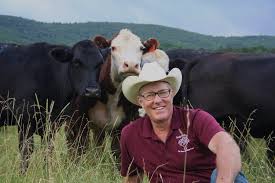 ASS FARMER MAGAZINE, CALL 800-748-9808
ASS FARMER MAGAZINE, CALL 800-748-9808 - Xena and Wellstone ..... XXOOThursday, March 13, 2019
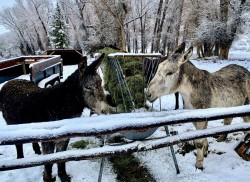 After living on the James Ranch for the past 11 years, Xena, the guard donkey for the pastured poultry business starts a new adventurous chapter of her long life by joining a family in Buena Vista that races burros and packs them into the Colorado high country.
After living on the James Ranch for the past 11 years, Xena, the guard donkey for the pastured poultry business starts a new adventurous chapter of her long life by joining a family in Buena Vista that races burros and packs them into the Colorado high country.
READ MORE - MOUNTAIN COMMUNITY-SUPPORTED, WILD-CAUGHT ALASKAN SEAFOODThursday, September 26, 2018
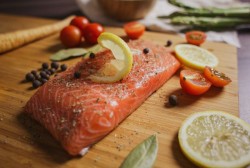 The James Ranch Market is thrilled to be offering wild-caught Alaskan salmon to our customers in a partnership with Colorado locals Eric and MJ at Silver Wave Salmon.
The James Ranch Market is thrilled to be offering wild-caught Alaskan salmon to our customers in a partnership with Colorado locals Eric and MJ at Silver Wave Salmon.
READ MORE - Connecting with Nature and Yourself: Yoga and Pilates on the TerracesThursday, July 02, 2018
 Enjoy yoga and Pilates on the Terraces at the James Ranch this summer. Extending your yoga and Pilates practice to the outdoors logs some major benefits.
Enjoy yoga and Pilates on the Terraces at the James Ranch this summer. Extending your yoga and Pilates practice to the outdoors logs some major benefits.
READ MORE - Fresh Cut Flowers - A Tradition at the James RanchThursday, February 08, 2018
.jpg) Fresh cut flowers have been a long-standing tradition at the Gardens at James Ranch. For over two decades Jenn and Joe Wheeling and their family have tended this wonderfully productive plot of land, supplying the Durango area not only with wonderful vegetables, but with gorgeous flowers as well. As the Wheelings move on to other pursuits, Mountain Belle Flower Farm is proud and delighted to be continuing this flower-growing legacy at the Gardens at James Ranch.
Fresh cut flowers have been a long-standing tradition at the Gardens at James Ranch. For over two decades Jenn and Joe Wheeling and their family have tended this wonderfully productive plot of land, supplying the Durango area not only with wonderful vegetables, but with gorgeous flowers as well. As the Wheelings move on to other pursuits, Mountain Belle Flower Farm is proud and delighted to be continuing this flower-growing legacy at the Gardens at James Ranch.
READ MORE - Converting from Crazy - Ida, Ida IdahoThursday, December 07, 2017
 With a new clue received from a local magazine picked up in Jackson Hole, the Stewarts are headed to Driggs, Idaho to meet a like-minded chef then head to Boise, which has been touted as a new foodie city, then up to Coeur d' Alene which is headquarters for Tractor Sodas, the Grill's new organic soft drinks.
With a new clue received from a local magazine picked up in Jackson Hole, the Stewarts are headed to Driggs, Idaho to meet a like-minded chef then head to Boise, which has been touted as a new foodie city, then up to Coeur d' Alene which is headquarters for Tractor Sodas, the Grill's new organic soft drinks.
READ MORE - Converting from Crazy - The Denver/Boulder InspirationThursday, November 17, 2017
 The Stewart's are on their epic research trip and stopping off first in Denver and Boulder. There are a lot of great restaurants in the area, but there are three that actually have their own farms/ranches that supply a majority of their ingredients just like the Harvest Grill. Their goal is to see the kitchens and meet with the chefs.
The Stewart's are on their epic research trip and stopping off first in Denver and Boulder. There are a lot of great restaurants in the area, but there are three that actually have their own farms/ranches that supply a majority of their ingredients just like the Harvest Grill. Their goal is to see the kitchens and meet with the chefs.
READ MORE - Converting from Crazy - Wyoming, Detour to Utah and Back to WyomingThursday, November 17, 2017
 Due to weather conditions in Jackson, the Stewarts headed a bit south to Utah and had a chance to do a meet and eat with at a restaurant that had one of their favorite kitchen layouts. They also surprised Sasha with a new addition to the family (four legged and furry).
Due to weather conditions in Jackson, the Stewarts headed a bit south to Utah and had a chance to do a meet and eat with at a restaurant that had one of their favorite kitchen layouts. They also surprised Sasha with a new addition to the family (four legged and furry).
READ MORE - Converting from Crazy (The Stewart family’s quest for knowledge)Thursday, November 16, 2017
 Cynthia and Robert decided to research their next adventuring into the restaurant world by taking a research trip in a motorhome to different restaurants around the western United States. Their goals are to see other kitchens, talk to chefs, understand the restaurant culture and learn how to recruit an employee team that will join in their dream of the ultimate farm-to-table dining experience.
Cynthia and Robert decided to research their next adventuring into the restaurant world by taking a research trip in a motorhome to different restaurants around the western United States. Their goals are to see other kitchens, talk to chefs, understand the restaurant culture and learn how to recruit an employee team that will join in their dream of the ultimate farm-to-table dining experience.
READ MORE - Farm To LunchboxThursday, September 21, 2017
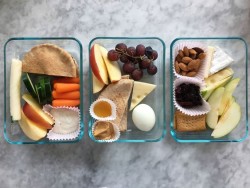 Are there any other parents out there like me who groan internally with the thought of crafting a daily, nutritious, filling school lunch that your children will actually eat? I’m sure there are. I am deeply committed to feeding my family nutrient-dense foods from our farm as much as I can. So for this reason, I roll up my sleeves and do a little planning. At this time of year, there is such amazing, local food available that it is a natural fit to work some of it into your kids’ school lunch.
Are there any other parents out there like me who groan internally with the thought of crafting a daily, nutritious, filling school lunch that your children will actually eat? I’m sure there are. I am deeply committed to feeding my family nutrient-dense foods from our farm as much as I can. So for this reason, I roll up my sleeves and do a little planning. At this time of year, there is such amazing, local food available that it is a natural fit to work some of it into your kids’ school lunch.
READ MORE - Squash Sackin’ and Pumpkin Huntin’Thursday, September 07, 2017There’s a bumper crop of winter squash and pumpkins in the Gardens at James Ranch this year! Instead of hauling it all in, we’d like to invite you to participate and get a great deal.
READ MORE - Dryland Corn and Elote Con CremaThursday, September 07, 2017
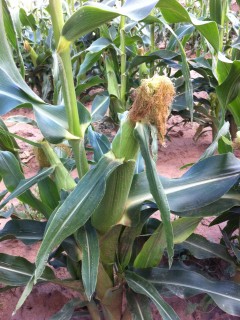 Four years ago I (Cynthia) was walking through the Durango Farmer’s Market to see what I could buy for the Grill to serve. I stopped at a booth that had a corn stock that was only 4 feet high but had these large, beautiful ears of corn jetting off the sides of it. This was my first introduction to dry land corn.
Four years ago I (Cynthia) was walking through the Durango Farmer’s Market to see what I could buy for the Grill to serve. I stopped at a booth that had a corn stock that was only 4 feet high but had these large, beautiful ears of corn jetting off the sides of it. This was my first introduction to dry land corn.
READ MORE - Wasps Are Friends, Not The EnemyThursday, September 02, 2017
.jpg) Since I have been actively working on the ranch the last few years, I have been paying attention to the wasp populations and actively encouraging their numbers by building housing and planting more and more bushes and plants with flowers to feed them. Beneficial wasps, both predatory and parasitoid, are another way we accomplish chemical-free, organic farming.
Since I have been actively working on the ranch the last few years, I have been paying attention to the wasp populations and actively encouraging their numbers by building housing and planting more and more bushes and plants with flowers to feed them. Beneficial wasps, both predatory and parasitoid, are another way we accomplish chemical-free, organic farming.
READ MORE - Yoga At The TerracesThursday, August 10, 2017
 Cool dew on your feet, gentle mooing in the background, and an experience yoga teacher leading you through morning movement guranteed to leave you feeling refreshed and energized for your day. This is yoga on the Terraces at James Ranch.
Cool dew on your feet, gentle mooing in the background, and an experience yoga teacher leading you through morning movement guranteed to leave you feeling refreshed and energized for your day. This is yoga on the Terraces at James Ranch.
READ MORE - It Takes A Village To Feed A VillageThursday, August 10, 2017
 The families of the James Ranch provide a well-rounded variety of organically grown food products for the local community: 100% grass-fed beef, artisan raw milk cheeses, pastured pork and eggs, fresh produce and flowers, and our restaurant (Harvest Grill and Greens at the James Ranch Terraces). It's a family affair and we have a lot of moving parts that come together to offer our community the freshest, most nutrient-dense food in the Four Corners. We are also proud to carry products from other local farmers! We'd love to take a second to introduce to you the current lineup of farmers that we'll be supporting and carrying at James Ranch Market and Harvest Grill.
The families of the James Ranch provide a well-rounded variety of organically grown food products for the local community: 100% grass-fed beef, artisan raw milk cheeses, pastured pork and eggs, fresh produce and flowers, and our restaurant (Harvest Grill and Greens at the James Ranch Terraces). It's a family affair and we have a lot of moving parts that come together to offer our community the freshest, most nutrient-dense food in the Four Corners. We are also proud to carry products from other local farmers! We'd love to take a second to introduce to you the current lineup of farmers that we'll be supporting and carrying at James Ranch Market and Harvest Grill.
READ MORE

